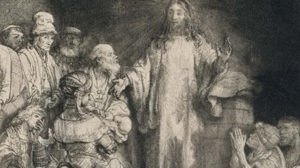Scripture:
Acts 8:1b-8
John 6:35-40
Reflection:
Many families have great and long standing traditions. In the movie “Blindside” (a true story), the family had a tradition of having a very informal Thanksgiving dinner around the television with Ole Miss playing a football game. Then “Big Mike” was invited to stay for Thanksgiving. Following the inspiration of a Norman Rockwell painting and reflecting on the possibility of having something he had never before imagined possible, Big Mike fixed his dinner plate and went to sit at the formal dining room table to eat. Taking his lead, the mother turns the game off and ushers the entire family to the dining room table where they pray together and then share thoughts, hopes, and stories.
In this simple moment, a great shift took place. What was once considered set in stone suddenly developed into another possibility, another understanding of the meal and the day, another way of being together for that moment. This happens more frequently than we might imagine. I am able to remember some very strong and unchangeable Christmas traditions from my family going back to Ireland and England. Then, one year, I was away and would always be away on Christmas Day (it is a “work” day for us !!!). All of those immoveable traditions went sliding down the hill once my mother decided Christmas would not be celebrated until I came home to visit over New Year’s. It happened – a change, a shift, a new way of celebrating Christmas and a new way of being present to one another as family.
Our Scriptures today invite us to visualize a great sea change in understanding God’s life with God’s people after the Resurrection of the Lord Jesus. In Acts, we have before us two groups of people, i.e. those of Jerusalem and those of Samaria. Jerusalem was the bastion of tradition and understanding how revelation of God’s life worked. This was a sophisticated people who could quote chapter and verse of every book of scripture as well as dictate the manner and purpose of every ritual and form of prayer. The protectors of the tradition lived here. At the same time, in Samaria, we have those who are poorly educated, they are the poor relatives of Judaism who are neglected, oppressed and shunned. A great tension existed between the Israelites and the Samaritans. Yet, we see that Jerusalem violently rejects the disciples and the Word of God while the Samaritans listen intently, accept the Word of God, become believers in great joy and wonder. The traditions and the protection of these had become so hardened for those of Jerusalem that no other possible development, not even the fulfillment of those very traditions, could impact their faith life while the Samaritans maintained openness to other developing possibilities in faith.
Our Gospel reading puts it all into Easter context for us. Jesus is the bread of life, i.e. the source of life, i.e. the staff of life. He Himself is the nourishment and the strength of life. Relationship with the Risen Lord Jesus is the core of our faith, our theology, our spirituality, and even our movements of the heart like poetry and song. The personal, saving relationship with the Risen Lord rather than any verbal formulation or ritual way of doing things must be the starting point for our experience of faith, prayer and living the disciple’s life. Our formulations and rituals must be built upon and grow out of that rich, wondrous, and mysterious relationship with the Lord Jesus which is ours through the gift of our baptism. From that moment on, we were invited to listen to God’s Word attentively, accept and believe in continuing joy and wonder, always ready for some surprising way that God makes Himself known to us in life. This is the primary fruit of the Resurrection of the Lord Jesus – we live as brothers and sisters with Him and one another. Let us rejoice and be glad !!!
Fr. Richard Burke, CP, is a member of St. Paul of the Cross Province and also serves on the Provincial Council of Holy Cross Province. He lives at St. Ann’s Monastery in Scranton, Pennsylvania.

